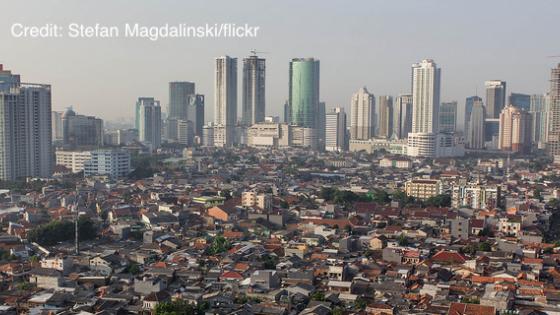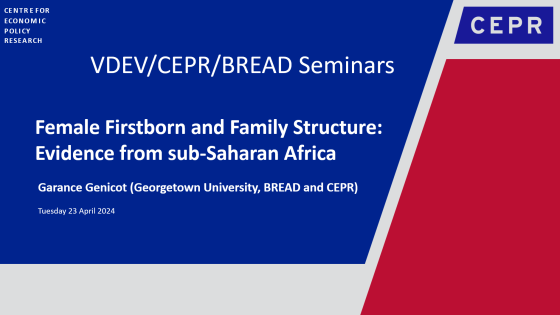Global economic growth is making a stronger than expected comeback. It is likely to accelerate to as much as 4% in 2018, from 3.2% in 2016 (IMF 2018). This is good news on many fronts, but can we expect stronger growth to reduce the social frustrations about rising inequality and economic insecurity that have rocked the political establishments in many countries?
This is the implicit assumption behind the standard growth model of recent decades. Its assumption is that a rising tide of GDP – promoted particularly by supply-side reforms, increased incentives for private capital investment, and export-oriented production – will ultimately lift all boats.
But recent political developments in many countries suggest that most of their citizens lack confidence in this assumption. And since the financial crisis, political leaders have been voicing similar scepticism, calling repeatedly in G20 communiqués and UN declarations for new and more deliberate efforts to make economic growth more socially inclusive.
Despite this consensus that broad socioeconomic progress should be a much stronger priority in economic policy, GDP growth continues to be the primary way national economic performance is tracked statistically by governments and reported in the media. Several research efforts have examined this challenge over the years, including notably the Commission on the Measurement of Economic Performance and Social Progress, generally referred to as the 'Stiglitz-Sen-Fitoussi Commission', which issued its report in 2009 (Stiglitz et al. 2009).
What gets measured tends to get managed, and so the primacy of GDP statistics tends to reinforce the imbalance of attention and resources applied to macroeconomic and financial stability policies. This prioritises the overall level of economic activity, rather than the strength and equity of institutions and policy incentives in structural policy areas – such as skills development, labour markets, competition, investor and corporate governance, social protection, infrastructure and basic services – that play an important role in shaping the pattern of economic activity, and particularly the breadth of social participation in the process and benefits of growth.
This is surely part of the reason that consensus on inclusive growth has yet to progress from a collective aspiration to concerted action that would change the standard model that shapes the mindset of most economic policymakers, and the priorities they set.
In January 2018, at the World Economic Forum’s Annual Meeting in Davos, an initiative called Shaping the Future of Economic Progress published a broader measure of national economic performance – the 'Inclusive Development Index', or IDI (World Economic Forum 2018). The IDI is based on the notion that most citizens do not evaluate their countries' economic progress by the amount of goods and services produced in the economy (GDP), but by their household's standard of living. This is a multidimensional phenomenon that encompasses income, employment opportunity, economic security, and quality of life.
We can understand GDP growth as a top-line measure of national economic performance in the sense that it is a means (albeit a crucially important one) to the bottom-line societal measure of success, which is broad-based progress in living standards. Therefore, policymakers and citizens alike would benefit from having an alternative, or at least complementary, bottom-line metric that measures the level and rate of improvement in shared socioeconomic progress.
The IDI provides a bottom-line report card for 103 countries. It is based on a wider dashboard of 12 indicators in three areas: growth and development, inclusion, and intergenerational equity and sustainability.
The IDI’s comparative data provide striking evidence that we cannot rely solely on strong GDP growth to generate inclusive socioeconomic progress and a rising median standard of living. GDP per capita growth is weakly correlated with performance for three-quarters of IDI indicators, including those pertaining to employment, income inequality, wealth inequality, median household income, public indebtedness and carbon intensity.
This is even clearer when we consider IDI trends over the past five years. All but three advanced countries have raised GDP over this period, but only 10 of 29 show clear progress on the IDI’s ‘Inclusion’ pillar. Inclusion deteriorated in the majority (16 out of 29), and in the remaining three this indicator has remained stable. This pattern is repeated in the relationship between GDP growth and the IDI’s ‘Intergenerational Equity and Sustainability’ pillar, for which it holds even for the group of countries with the strongest growth performance.
Developing country data show a similar disconnect between GDP growth and Inclusion. Of the 30 countries in the top two quintiles of GDP growth performance during the past five years, only six have scored similarly well on a majority of the Inclusion indicators, while 13 have been mediocre and the performance of 11 has been poor.
GDP growth is a necessary but not sufficient condition for achievement of the broad-based progress in living standards on which citizens ultimately judge the economic success of their countries. This message is important to bear in mind at a time when global economic growth is finally rebounding to a more robust level. Political and business leaders should not expect higher growth to be a panacea for the social frustrations that have roiled the politics of many countries in recent years.
A new growth model is needed that places people and living standards at the centre of national economic policy and international economic integration (Samans et al. 2017). Many countries have significant unexploited potential to simultaneously increase economic growth and social inclusion. But activating the virtuous circle of inclusive growth more fully will require them to:
- Reimagine structural economic reform as an effort to strengthen the ecosystem of institutions and structural policies in an economy. They play an important role in driving both broad-based progress in living standards and higher growth; and
- Adopt a broader metric of national economic success that will correspond better to, and incentivises policymaker performance against, society’s bottom-line measure of economic progress: broad and sustained improvement in living standards.
The implicit income distribution system within many countries is severely underperforming or relatively underdeveloped, but this is due to a lack of attention to key areas of policy, rather than the iron law of capitalism. Inequality is largely an endogenous rather than exogenous challenge for policymakers. It needs to be recognised, prioritised, and measured as such in order to sustain public confidence in the capacity of both technological progress, and of international economic integration to support rising living standards for all.
References
IMF (2018), World Economic Outlook Update January 2018: Brighter Prospects, Optimistic Markets, Challenges Ahead.
Samans, R, J Blanke, G Corrigan and M Drzeniek Hanouz (2017), "Rising to the Challenge of Inclusive Growth and Development", in Inclusive Growth and Development Report, World Economic Forum.
Stiglitz, J, A Sen, J-P Fitoussi (2009), Report of the Commission on the Measurement of Economic performance and Social Progress, Commission on the Measurement of Economic Performance and Social Progress.
World Economic Forum (2018), Inclusive Development Index, World Economic Forum.




